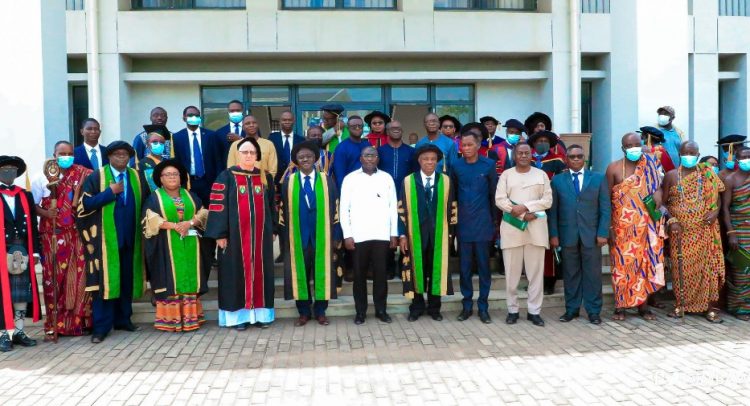The second phase of the development of the permanent campus of the University of Health and Allied Sciences (UHAS) will commence in November, 2020 after months of postponement due to the outbreak of the novel coronavirus.
Following years of discussions and negotiations, the Ghanaian government and that of the People’s Republic of China commenced the processes to implement the construction after signing and exchanging notes in January 2019.
However, the project which is estimated to cost about $60 million could not take off as expected. The outbreak of Covid-19 in China, sponsors of the project and later the world, including Ghana halted the commencement.
Speaking at the third session of the fifth UHAS Congregation at Sokode, near Ho, the Vice President, Dr. Mahamudu Bawumia announced that following the sterling management of the Covid-19 pandemic the Chinese are ready to come in and begin the project before the end of November, 2020.
The event which was observed in three batches to adhere with Covid-19 safety protocols saw 786 students graduating, including UHAS’ first cohort of 41 medical doctors.
He added that the GHS6 million Government of Ghana (GoG) counterpart funding will be released timeously to ensure smooth completion of the project which is scheduled to last 24 months.
The project will cover a total floor area of 29,200 square meters, will comprise a fully furnished Central Administration Block, School of Nursing and Midwifery, Duty and Equipment Rooms. Thus, three times the size of the phase one project completed a few years ago.
Vice President, Dr Mahamadu Bawumia assured that the government through the Ghana Education Trust Fund (GETFUND), will construct and complete key facilities on both the Sokode-Ho and Hohoe Campuses of UHAS.
He commended UHAS for collaborating with the Ho Teaching Hospital to respond to the call to set-up a testing centre for Covid-19 and doing exceptional in that regard. The centre has so far done over 15,700 out of which about 850 have come out positive.
The Vice Chancellor of UHAS, Professor John Owusu Gyapong announced that UHAS is introducing new programmes in dentistry, sports and exercise medicine as well as physician assistant in Anaesthesia. Undergraduate programmes of the six Schools in UHAS include, Allied Health Sciences (SAHS), Basic and Biomedical Sciences (SBBS), Medicine (SOM), Nursing and Midwifery (SoNAM), Pharmacy (SoP), and Public health (SPH). Based on this UHAS currently has 35 departments and offers 20 programmes.
The establishment of the UHAS Research Fund has seen a boost in research projects by the university with a successful disbursement of funds for the first round and second round underway. Apart from this UHAS has signed research grants with other partners and funding agencies to the tune of $830,460.90. These and many more research activities are making UHAS a leading research oriented university in the country, Prof. Gyapong noted.
Prof. Enyonam Yao Kwawukume, Founder of Family Health University College who was the guest speaker urged graduates to accept postings to deprived areas and think outside the box at all times.
The Council Chairman of UHAS, Justice Mr Jones Mawulorn Dotse also urged graduates not to be complacent and be good examples wherever they found themselves.
The occasion was used to honour Rev. Fr. Andrew Campbell with an honorary doctorate degree for his immeasurable service and care for the less privileged in the society, particularly lepers.
Several students were awarded for excelling in various fields and schools they studied from. Out of the lot, Rosina Afua Ampomah Carr emerged the overall best and outstanding graduating UHAS student and won the Vice Chancellor’s prize. Victor Loglo won the Professor Fred Binka prize for the outstanding graduating student with demonstrated service to the University community.
UHAS student population for 2019/2020 stood at 5717 compared to 4989 in the previous academic year. The current population has 3356 regular students and 2358 sandwich students. Staff strength also stands at 834, including 269 Junior staff, 206 Senior staff, 292 Senior members (academic) and 67 Senior members administrative and professionals.
From Fred Duodu, Ho (k.duodu@yahoo.com)


